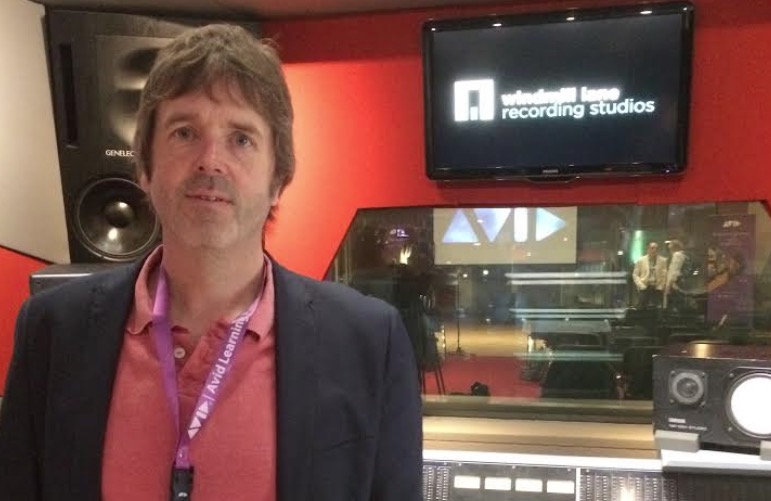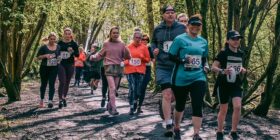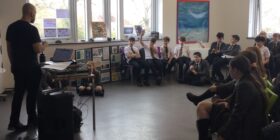Wrexham Glyndwr University academic lends expertise to online support portal for UK musicians

An online platform which helps musicians find new ways of working during the coronavirus pandemic has been supported by a Wrexham Glyndwr University academic.
The new site, Interface:Response, provides resources and inspiration to help musicians – many of whom have found their work severely affected by public health measures designed to slow the spread of coronavirus – adapt their practice through a wealth of resources, advice, curation and much more.
Among those who helped with the project is Dr Jason Woolley, who lectures in Creative Media Technology at Wrexham Glyndwr University – whose research on musicians and employability is set to be published very soon.
He was asked to help support the project as a consultant after working alongside members of UCanPlay, the site’s developers, on curriculum and course design.
The Interface:Response project was funded by Innovate UK, and works in partnership with the Musicians’ Union and NYMAZ.
Dr Woolley said: “The guys at UCanPlay are aware of my research into Employability in the Creative Industries and my research interest as a musician in work and career pathways in the music industry.
“So I think my experience with creative digital technologies, and my first hand understanding on the plight of many musicians during the pandemic, particularly those that have fallen through the net with regard to Government support, meant that I could make a positive contribution to the project.
“I was one of five consultants who worked as a team to plan and realise content for the Interface: Response resource.”
“I had specific responsibilities for an area of the project that considered and delivered resources to support musicians to be able to rehearse and perform online. I also created a number of resources which were utilised to serve and support other areas of the I:R resource project including Teaching and Curate/Create.”
Having spoken with other musicians – including some of those who lecture alongside him in Glyndwr’s Creative Media Technology team – Dr Woolley believes the past few months have been a severe test for musicians – as opportunities for both work and to be creative have grown limited.
He said: “My experience is that the recent months, especially during lockdown and higher tiered measures, have been mentally and financially challenging for most musicians.
“Intrinsically motivated workers, such as musicians, spend a lifetime developing their skills and arguably the average musician often dedicates themselves beyond the financial rewards their efforts return in normal pre-pandemic circumstances.
“Under lockdown or social distancing regulation, live performing opportunities have been mostly non-existent – meaning that mental health is not just impacted upon by the financial strain of not being able to work, but also by the fact musicians are currently not able to do the very thing that is part of their ‘fabric’- which is to perform music live to an audience.”
Figures from UK Music and the Musicians’ Union suggest that the UK music industry – which contributed last year £5.8 billion to the UK economy – has been severely hit, with an estimated reduction of 80 per cent in musicians’ income.
And while there are areas where Dr Woolley believes that the current enforced changes may remain post-pandemic, he believes others – particularly live performance – will need a return to ‘normality’ to thrive.
He added: “I think as in the HE sector, some remote teaching practices may remain post emergency – in music education, some music teachers have been able to maintain a practice online via Zoom or other video call platforms.
“I think regarding live music, we will have to wait and see. I know a few local musicians that in the early parts of the first lockdown managed to earn some money from live performance, but it is hard to find anyone who is convinced that live performance translates to an audience online as well as it does in person.”
Drawing on upcoming research on how musicians operate in the modern economy, Dr Woolley believes many find themselves missing out on government support – and should consider using resources such as Interface:Response to adapt and strengthen their work.
He added: “Some of my colleagues at Glyndwr were kind enough to take part in a focus group for my recent research project into Musicians and the Gig Economy, the findings of which are to be published in an upcoming book called ‘Decent Work’ for Emerald Publishing very soon.
“In discussions with these musicians and others from my broader network, it is clear that many, although not all, slipped through the Government support net when they have lost work in the sector – and have had to rely on either diversifying their portfolio or moving their practice online, albeit with a reduced financial return.
“Some musicians are feeling that there is no way through. The Guardian recently reported one-third of professional British musicians are considering giving up their careers amid the coronavirus pandemic.
“Musicians are generally categorized atypical workers in that they are more likely to be self-employed, and generate their living from portfolio careers often giving them the self-employed and part-time profiles that don’t align with the financial support packages offered by central government.
“Going forward, I think that every musician should try to engage with resources such as Interface: Response and organisations like the Musicians’ Union in order to strengthen their community network and continue to practice their craft and reach their audience as best they can whilst the pandemic emergency continues.”
To find out more about Interface: Response, visit: http://www.interfaceresponse.com/
Spotted something? Got a story? Email [email protected]












